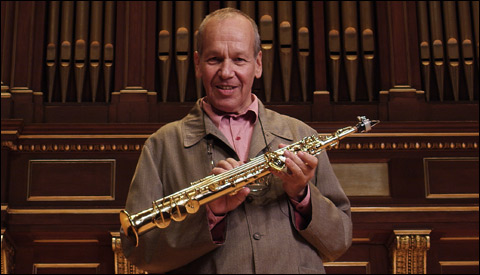
SOUND SCIENTIST Lacy’s music combines compositional detail and free-jazz sprawl. |
For Josh Sinton, Steve Lacy stood out almost from the beginning. Sinton had been browsing the “Saxophone Stylists” volume of his father’s Franklin Mint collection of classic jazz — a volume that began with major figures like Coleman Hawkins, Lester Young, Sonny Rollins, and John Coltrane and then went on for four discs of “everyone else.” Among “everyone else,” Lacy — the great soprano-saxophonist and composer — was playing “Just One of Those Things” on a track by the Gil Evans band from 1957. Recalls Sinton: “To this day, it’s still one of my favorite bebop solos, and one of the great statements on the saxophone.”Sinton — a baritone-saxophonist and bass-clarinettist — leads the quartet Ideal Bread, who focus exclusively on the music of Lacy. Their new Transmit (Cuneiform) is their second volume of “The Music of Steve Lacy.” It’s just the latest example of Lacy’s music finding new life.
Lacy — who died six years ago, on June 4 — was a life-long outsider. A New Yorker, he fell in love with Sidney Bechet’s big soprano sound and picked up an instrument no one else was playing. (There’s evidence that Lacy was an influence on John Coltrane’s picking up the soprano.) He started out as a Dixieland player, was recruited into the avant-garde by Cecil Taylor, played a bit in Thelonious Monk’s band, recorded with Evans, had a couple of records under his own name on Prestige, and then decamped to Europe.
Long revered by fellow musicians, and with a huge discography as a leader as well as a deep catalogue of original compositions, he isn’t much known by the general or the music-loving public — not even casually. The most common comparison is with his hero (and his boss for a few months in 1960), Monk: an idiosyncratic master of his instrument, a composer of genius, whose work for much of his career was a house secret among jazz musicians. For a time in the early ’60s, Lacy led a band with the trombonist Roswell Rudd, who played the music of Monk exclusively, just as Ideal Bread play only Lacy now. Lacy said he was drawn to Monk’s work because he liked it, no one else was playing it, and “it fit my horn.” Monk, however went on to greater fame: a contract with Columbia Records, a Time magazine cover, posthumous canonization. Despite a short stint on RCA, Lacy’s work came out on a plethora of American and European indie labels.
So, for most of his life, he was like Monk in that no one played Lacy’s music except Lacy. But in 2002, he returned from Paris to teach at New England Conservatory. And some of his music has been bubbling up here and there among his former students and colleagues — in scattered live performances, but also on discs by Jeremy Udden, Monika Heidemann, and, of course, Ideal Bread.